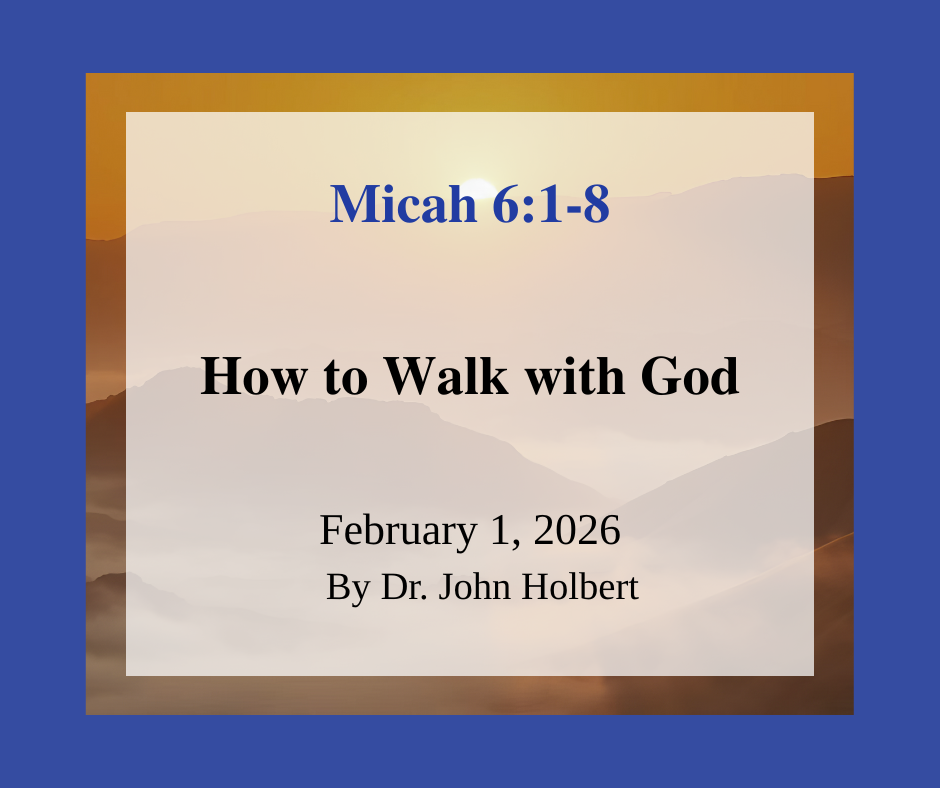How to Walk with God - Reflections on Micah 6:1-8, Fourth Sunday after Epiphany, Year A
by John C. Holbert on Sunday, November 16, 2025

Micah 6 is among the most quoted passages in the Hebrew Bible, with its utter rejection of overbearing worship in favor of three simple-sounding commands, words that appear etched in many public places. My own church, Westwood United Methodist in Los Angeles, placed these words in an illuminated metal bench (quite uncomfortable, I fear!) just outside our grand sanctuary. It reads, as it often does, “Do justice, love kindness, and walk humbly with God.” These actions we are commanded to perform by the prophet in lieu of luxurious worship that culminates in child sacrifice to God (Micah 6:7)! The entire passage is worthy of careful commentary, but I choose to focus today on the three commands, each of which deserves close examination, after I provide a brief look at the wider context.
The text is set in a courtroom. 6:1 employs that famous legal term rib that signals a trial scene.
“Stand and plead your case (rib) with the mountains;
let the hills hear your voice.
Listen, you mountains, to the case brought by (rib) God,
you deepest foundations of earth,
because YHWH has a case (rib) against the people;
it is YHWH who has a controversy with Israel!”
Three times we are told that this trial will be headed by YHWH, while the jury will be the mountains and the hills, those physical features of the landscape that have endured vast amounts of time and are thus worthy to judge the recalcitrant people of YHWH, latecomers to the world of the mountains, who have clearly veered dangerously from the course YHWH has set for them.
The case is then presented with YHWH now both attorney and plaintiff:
“My people, what have I done to you?
How have I tired you out? Answer me!”
YHWH then proceeds to remind Israel of all that God has done for them, from the central claim of freedom from Egyptian bondage, to the gift of Moses, Aaron, and Miriam in the wilderness, to the thwarting of the plot to destroy Israel devised by Balak of Moab, to the final protection of the wandering people at Shittim and Gilgal just before entrance into the land of promise (Micah 6:3-4).
The response to these plaintive cries from God are found in 6:6-8.
“How (or “with what”) shall I approach YHWH,
bow before the High God?
Shall I approach with burnt offerings,
with year-old calves?
Will YHWH find pleasure in a thousand rams,
or with ten thousand rivers of oil?
Shall I give my first-born for my transgression,
the fruit of my body for my life’s sin?”
The accused people of God reply to YHWH’s case by searching for the right approach to the aggrieved deity: traditional sacrifices of calves, rams, streams of sacred oil, or in a final attempt, the horrifying offering of the first-born child as a way of assuaging the demanding God? Apparently, none of that is in the end what YHWH desires from the people who have not done what YHWH has always hoped for from the chosen ones.
“You mortal (‘adam), YHWH has told you what is good ( or “right” or “expected”);
What is it YHWH seeks from you?
Surely, the doing of justice,
the loving of chesed,
a ‘willing’ walk with your God.”
“Justice” is that familiar word found on many prophets’ lips that urges humans to pursue the right actions of equity among all people that leads inexorably to shalom. The Hebrew word comes from the word “to judge,” as in a court, and is the noun built on that verb. “Right judgment,” “fair dealings with all” might be verbal equivalents. Chesed is that nearly untranslatable word that is regularly used to describe YHWH’s unbreakable covenant with the chosen people. “Kindness” (NRSV) is a very weak rendering of this word; the command calls for the people to love the wonderful and mysterious covenant between YHWH and people that serves as the foundation of their relationship to one another.
The final word is certainly difficult to translate, but “humbly,” I think, is perhaps the poorest of guesses, though it has become for many the essence of Micah’s claim. NRSV’s Study Bible footnote suggests a translation of “wisely,” calling it “a better translation” (see page 1311). The word is found in only two places in the Hebrew Bible, the other being Proverbs 11:2, which the NRSV reads: “When pride comes, then comes disgrace/but wisdom (chokmah) is with the humble” (tsnah). It appears that the NRSV translators have connected the word with “wisdom” and concluded that it has something to do with “being wise.” Let me suggest another possibility. The word may imply “carefully” or “willingly/readily.” In short, nevertheless, I doubt we can ever discern precisely the import of the word, but I am convinced that “humbly” is only a guess at best. Nevertheless, it has led more than a few readers to picture a deep and humble piety here, when I seriously doubt that that was Micah’s intent at all. Still, we can see that instead of extravagant worship, what YHWH requires are actions of justice and resolute works of unbreakable love for all the world. And those actions, with my reading, must be done with a consistent will. YHWH’s case is thus resolved and the accused now know what it is that YHWH demands of them. And, I would say, so do we modern Christians.
